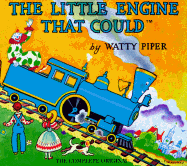The Little Engine That Could

 |
 |
 |
|---|---|---|
     |
Sensitivity |      |
     |
Judgment |      |
     |
Focus |      |
     |
Action |      |
by Watty Piper
The Little Engine That Could is about prudence, morality, and imagination. The genre of the story is , the setting is Ahistorical.
A little steam engine manages to tow a train in need over the mountain.
Moral reasoning in the story focuses on concern for relationships.
The theme of the story is Difficult problems can be solved when everyone works together.
 |
Violence |
 |
Cruelty |
 |
Rudeness |
 |
Religion/Spirituality |
 |
Stereotypes There is stereotyped male sex role and stereotyped female sex role in the story. |
Key Virtues
- Cooperation
- Hard work
- Persistence
- Altruism/Unselfish care for others
- Courage
- Helpfulness
- Self confidence
- Compassion
- Generosity
- Hope
Key Vices
- Arrogance
- Unkind
- Contempt
- Obstinate/Uncooperative
- Selfish
- Vanity
- Cruelty
- Excludes others
The 4 Component Model
- Ethical Sensitivity - Evidence of concern for others and awareness of the consequences of one's actions.
- Ethical Judgment - Shows characters deliberating about ethical choices.
- Ethical Focus - Addresses the ethical demand in the situation, prioritizing moral goals and responsibilities over selfish interests.
- Ethical Action - Has a character who takes several steps to reach a moral goal and perseveres to complete the ethical action.